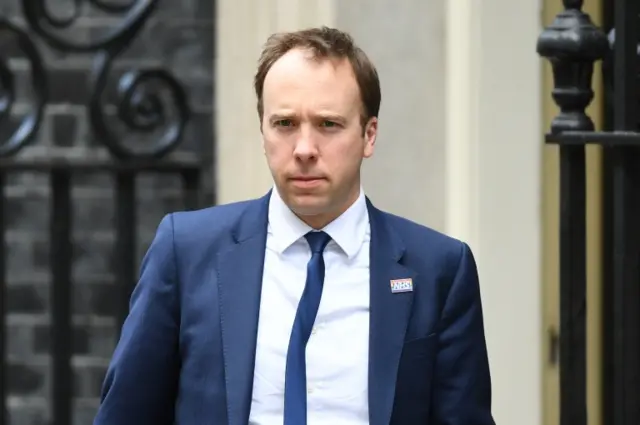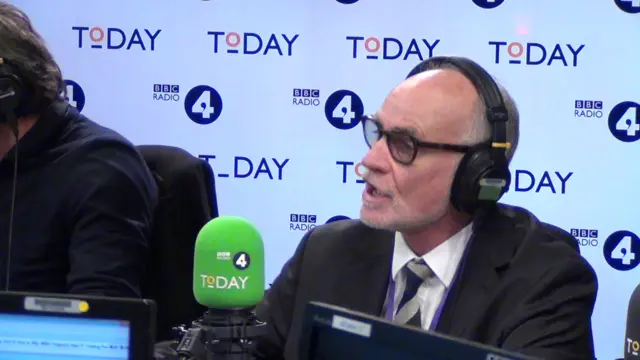Should the PM resign?published at 08:34 GMT 26 March 2019
 Today Programme
Today Programme
BBC Radio 4
Matt Hancock is asked if the prime minister should resign.
"Changing the prime minister doesn't solve anything," the health secretary replies.
MPs vote by 286 to 344 to reject the government’s withdrawal agreement - on the day the UK was due to leave the EU
The Commons has been debating a motion on the terms of the UK's exit
The political declaration, which sets out the future relationship, was not considered
The vote - the third time the government had been defeated over its deal - throws the UK’s plans into more confusion
Theresa May says the result will have "grave" implications and the "legal default" was that the UK would leave the EU on 12 April
Labour leader Jeremy Corbyn urges the PM to call an election
Thousands of Leave supporters gather outside Parliament to protest against Brexit delay
Joseph Lee, Katie Wright, Francesca Gillett and Sarah Collerton
 Today Programme
Today Programme
BBC Radio 4
Matt Hancock is asked if the prime minister should resign.
"Changing the prime minister doesn't solve anything," the health secretary replies.
 Today Programme
Today Programme
BBC Radio 4
When asked if the prime minister will abide by Wednesday's indicative votes in Parliament, Mr Hancock replies "clearly we've got to listen to what the Commons says."
However he adds "we can't pre-commit to following whatever they vote for."
"They might vote for something clearly impractical or they might vote for two things that are incompatible."
"If the Commons voted for the sun to rise in the West the government wouldn't be able to implement that."
 Today Programme
Today Programme
BBC Radio 4
 Image source, Getty Images
Image source, Getty ImagesHealth Secretary Matt Hancock says "yesterday demonstrated that the option of no deal simply won't be allowed by the Commons".
"The best way through this impasse is the one deal that has been negotiated by the EU," he says.
 Today Programme
Today Programme
BBC Radio 4
When asked about Theresa May's future, Lord Heseltine says her premiership "has been hanging by the flimsiest of thread for some weeks".
However he adds there is: "Not much point in changing the singer if you don't change the song."
Reacting to a story in today's Times newspaper in which an unnamed senior minister says there is no point in pretending that this is a government with a plan, our political correspondent tweets:
Allow X content?
This article contains content provided by X. We ask for your permission before anything is loaded, as they may be using cookies and other technologies. You may want to read X’s cookie policy, external and privacy policy, external before accepting. To view this content choose ‘accept and continue’.
Alistair Burt, who resigned as Foreign Office minister on Monday night, says in a statement that he had opted to defy the whip "for the country's sake".
"Having accepted the result of the referendum, I have worked and voted consistently for the best outcome for the country and constituency, which is to leave the EU with a good arrangement for the future," he says.
"Despite the best and determined efforts of the prime minister, her agreement with the EU continues to be rejected by parliament.
"We are running out of time for an alternative, and the risk of leaving without a deal, and continuing serious and disruptive uncertainty is affecting the UK profoundly."
Allow X content?
This article contains content provided by X. We ask for your permission before anything is loaded, as they may be using cookies and other technologies. You may want to read X’s cookie policy, external and privacy policy, external before accepting. To view this content choose ‘accept and continue’.
 Today Programme
Today Programme
BBC Radio 4
Former Conservative minister Michael Heseltine says he expects the House of Commons will seek some sort of compromise,which the government won't like.
"The ultimate test is to go back to the people," the peer says.
"It won't be easy but it will be a way of resolving the matter."
International development secretary tweets...
Allow X content?
This article contains content provided by X. We ask for your permission before anything is loaded, as they may be using cookies and other technologies. You may want to read X’s cookie policy, external and privacy policy, external before accepting. To view this content choose ‘accept and continue’.
 BBC Radio 4
BBC Radio 4
Richard Harrington says it would be legitimate to have another referendum if MPs backed revoking Article 50.
But the former industry minister tells the Today programme: "I don't think that's likely.
"If that were the case then I think it would be very plausible for the prime minister then to say: 'I don't want this because this is totally different from the last time the public were consulted in the first referendum'.
"Therefore, I feel it would be very legitimate before taking such a dramatic move as revoking Article 50 to have another referendum, to see where the public are at."
 BBC Radio 4
BBC Radio 4
More from Richard Harrington, who resigned as a business minister to oppose the government on the issue of indicative votes.
He tells BBC Radio 4's Today programme: "It's absurd that now we are in a position of political impasse and... Parliament hasn't actually talked about it on the floor of the House of Commons.
"That's what I call a democratic deficit. And Parliament has got to talk about it."
His full resignation letter is here:
Allow X content?
This article contains content provided by X. We ask for your permission before anything is loaded, as they may be using cookies and other technologies. You may want to read X’s cookie policy, external and privacy policy, external before accepting. To view this content choose ‘accept and continue’.
Richard Harrington, another of the Tory MPs who resigned last night to vote against the government, says he supports delivering Brexit “but not at the price of suicide”.
He says Parliament must take part in "reasoned debate" on the possible Brexit options.
“That's democracy," he tells BBC Radio 4's Today programme.
But he maintains Mrs May is a "person of great morality and integrity" and hopes she does not resign.
 Today Programme
Today Programme
BBC Radio 4
More from Steve Brine, who quit as a health minister to back the proposal for indicative votes, and was interviewed on the Today programme a little earlier.
"I will still, as I said in my letter to the prime minister... support her deal," he said.
"I still think it is the best of the options.
"Maybe what last night will do is focus some minds... those on my side who don't like the deal, maybe they will realise that the House of Commons is prepared to act.
"And, anything from here, as far as they are concerned, gets softer in terms of Brexit."
Mr Brine added: "If the House of Commons just simply cannot come up with anything to move us out of this, then everything is on the table.
"You have to accept that a second referendum or revoking Article 50 are on the table because they will probably be some options."
 BBC Radio 4
BBC Radio 4
Richard Harrington, one of the three Conservative ministers who resigned last night, says he did so because he wanted to "to get this nonsense of no deal off the table”.
He tells BBC Radio 4's Today programme it is "time this ridiculous economic experiment on the British people" by a minority of economists and politicians was stopped.
He says he remains “a big supporter of the prime minister’s deal”.
BBC political correspondent tweets:
Allow X content?
This article contains content provided by X. We ask for your permission before anything is loaded, as they may be using cookies and other technologies. You may want to read X’s cookie policy, external and privacy policy, external before accepting. To view this content choose ‘accept and continue’.
Pro-Brexit student activist tweets...
Allow X content?
This article contains content provided by X. We ask for your permission before anything is loaded, as they may be using cookies and other technologies. You may want to read X’s cookie policy, external and privacy policy, external before accepting. To view this content choose ‘accept and continue’.
 Today Programme
Today Programme
BBC Radio 4

Crispin Blunt, a Conservative MP and keen Brexit supporter, says the 30 rebels who voted against the government made the decision-making process even more difficult.
He says the prime minister can override this Parliament, which is a "Parliament of Remainers".
Asked if he would entertain the idea of revoking Article 50, he says: "Let's see how this is going to go.
"It has always been my view that whatever the decision of the British electorate in the referendum, we should properly commit to the decision they took.
"And If you are going to leave, you have got to take advantage of the opportunities that presents."
He added: "It may be that we do have to go back to square one but I still remain hopeful."
 BBC News Channel
BBC News Channel
The Department for Health has "done what is necessary" to prepare for a no-deal Brexit, but the House of Commons "won't let that happen", Health Secretary Matt Hancock says.
"It's not that we're not prepared," he tells BBC Breakfast.
 BBC News Channel
BBC News Channel
Health Secretary Matt Hancock is urging Brexit-supporting MPs to back Mrs May's deal.
He tells BBC Breakfast it is "now very clear" that the House of Commons is "not going to let [a no-deal Brexit] happen".
"The only way to deliver Brexit... is to vote for the prime minister's deal," he says.
 BBC News Channel
BBC News Channel
Political scientist Sir John Curtice says the latest research suggests "we are not keen on compromising on Brexit".
Speaking about those who voted to leave the EU, the Professor of Politics at Strathclyde University tells BBC Breakfast: “The trouble is that many of the 52% do not believe the deal implements their wishes effectively.”
“Public opinion is deeply polarised and Leavers and Remainers dislike Mrs May's withdrawal deal for different reasons," he says
“The single most popular option among those who voted Leave is to leave without a deal."
Meanwhile, the most popular option among Remainers is a second referendum, he says.
 Today Programme
Today Programme
BBC Radio 4
Labour MP Hilary Benn explains how the indicative votes process might work.
He says it's a simple process where MPs are invited to put forward a series of propositions – it could be a customs union with the EU or a free trade agreement.
The speaker will select these on Wednesday and they'll be listed on a piece of paper.
MPs will enter the division lobby, where they'll be given the piece of paper and can vote on as many options as they would be prepared to support. There is no way - at this stage - of marking preferences on the paper, he says.
The vote is not secret, he adds.
The results will be looked at on Wednesday night to see what's most popular and a similar process could follow next Monday.